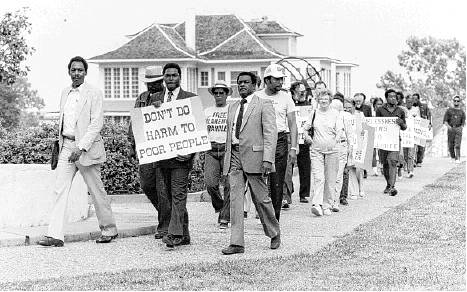LENWOOD JOHNSON: 1943-2018
Activist was a relentless public housing advocate
By Mike Snyder and John D. Harden
Lenwood Johnson, who relentlessly lobbied, badgered and annoyed government officials in an unsuccessful crusade to prevent the demolition of Houston’s largest public housing development, has died at 75.
Johnson, who had struggled for years with respiratory illness, experienced trouble breathing Friday evening and was taken by ambulance to St. Joseph Hospital, where he died, said Perata Bradley, a friend with whom Johnson had lived since last September.
In the 1980s and ’90s, Johnson served as atenant leader at Allen Parkway Village, a sprawling, 1,000-unit public housing development just west of downtown. He filed lawsuits, rallied his fellow tenants, spoke at countless public meetings and met with a Cabinet secretary in Washington in a struggle to preserve the development, which was razed in 1996.
Johnson later participated in campaigns to protect the historic character of Freedmen’s Town in the Fourth Ward, just south of Allen Parkway Village, and to prevent the destruction of streets paved with bricks laid by by freed slaves.
Read more: Historic Freedmen’s Town restoration paused after bricks replaced with new
“For a long time, he kept the movement alive as far as Allen Parkway Village and Freedmen’s Town,” said Deloyd Parker, the longtime leader of the SHAPE community center in the Third Ward southeast of downtown, who worked with Johnson on projects in historically African-American neighborhoods.
“I’m looking at his picture on the wall right now,” said Parker, explaining that he has a “wall of fame” at the SHAPE Center with photographs of people he admires.
Johnson’s style could be abrasive. He was critical of U.S. Rep. Sheila Jackson Lee, D-Houston, even as she tried unsuccessfully to persuade the Houston Housing Authority not to evict him in 2002.
And even though Johnson was unable to prevent the demolition of Allen Parkway Village, he got the attention of powerful leaders.
In 1994, he met in Washington with Henry Cisneros, then the U.S. secretary of Housing and Urban Development, who promised to give tenants a $300,000 grant to participate in planning the redevelopment of the project.
His efforts also exposed questionable conduct on the part of the housing authority. In response to a lawsuit brought by Johnson and other tenants, U.S. District Judge Kenneth Hoyt ruled in 1989 that the agency had intentionally allowed Allen Parkway Village to fall into disrepair to clear the way for its demolition and redevelopment.
Local and federal housing officials, pursuing new policies that emphasized mixed-income developments intended to lift tenants out of poverty, pressed forward with a plan to replace Allen Parkway Village with a smaller development with a more modern design.
Johnson, with the backing of the development’s tenants’ council and some elected officials, fought this plan, arguing that it would reduce the supply of housing available to the city’s poorest residents.
“You always knew where Len-wood Johnson stood, and that was on the side of the people, fighting for fair housing and the rights of low-income communities to have their voices heard,” Harris County Commissioner Rodney Ellis said.
“He fought hard to preserve the history of Houston’s African-American communities for future generations and earned his rightful place in the history books as one of the most dedicated housing activists Houston has known.”
Allen Parkway Village was replaced by a project half its size known as the Historic Oaks of Allen Parkway. Additional subsidized apartments and single-family homes were developed at other sites.
Bradley said Johnson was born in Brenham and moved to Houston in the 1970s. He moved into Allen Parkway Village in 1980, she said.
After the demolition and redevelopment of the property, Johnson moved to Irvington Village, another public housing development on Houston’s north side, and later into private rental housing.
Bradley said Johnson’s family had not completed arrangements for his funeral, likely to take place in Brenham. She said she hopes to organize a memorial service for Johnson in Houston. mike.snyder@chron.com twitter.com/chronsnyderjohn.harden@chron.com twitter.com/jdharden

